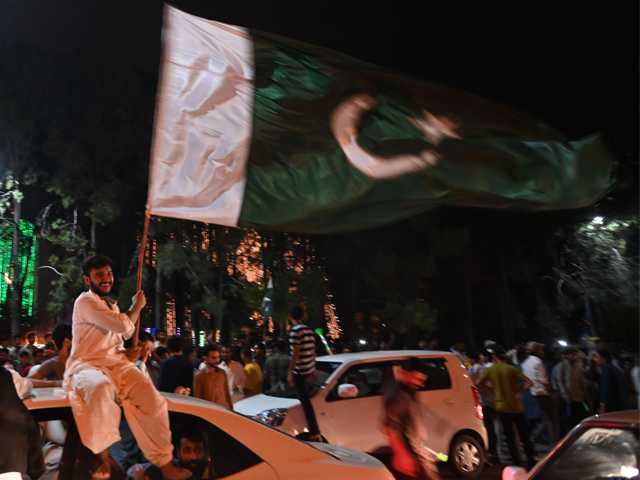Pakistan’s determined struggle for stability
The only hope that would make India retract from its illegal policies would be a resistance movement by Kashmiri youth

Pakistanis take to the streets during Independence Day celebrations in Islamabad on August 14, 2019, as the nation marks the 73rd anniversary of independence from British rule. (Photo by AAMIR QURESHI / AFP)
Today, the people of Pakistan celebrate under extremely challenging conditions. Apart from brief interludes of peace, Pakistan from its very inception has remained a crisis-ridden country, but the present situation is more complex and challenging. The recent heightened Kashmir crisis, however, has shifted the focus away that all Pakistanis and its leadership need to realise.
PM Modi, exploiting Pakistan’s present vulnerabilities, has struck at its jugular vein. It has in one stroke tried to establish its own parameters for international conduct and redefined its relations with Pakistan and the people of Kashmir by acting unilaterally. For PM Imran Khan, most of the political parties and the military leadership who were hoping for improved relations with India, this has come as a bombshell. One could argue that it was in the election manifesto of the BJP and a pillar of faith with Jan Singh to absorb Kashmir in India then why this surprise. The question is that the BJP by including in its manifesto the abrogation of Article 370 and Article 35(A) does not entitle it to act unilaterally and defy international obligations. If this logic is accepted then any UN or UNSC resolutions and global obligations will be discarded on the whims and narrow interests of countries. A law of jungle would prevail — a sure recipe and harbinger of conflicts and international and region chaos.
Pakistan now is in a long haul in its fight at the political and diplomatic level for championing the cause of the beleaguered Kashmiris and establishing its stake in the dispute. While India would not rest at merely absorbing Kashmir, it would simultaneously make every effort to confront and destabilise Pakistan.
At the national level, the picture is fairly bleak. Political opposition is up in arms against the government. The PTI leadership is even more aggressive and uncompromising. In this hostile environment, developing a strong national consensus against the Indian policy on Kashmir would remain restricted to the joint houses of parliament resolution condemning India for changing the status quo arbitrarily and brutally suppressing the indigenous movement.
The role of the United States at this time would be critical for perhaps it is the only country that could influence India, if at all. But what be its motivations apart from seeing that the conflict does not spin out of control as both countries are nuclear powers. Its other interest is that this situation does not adversely impact the Afghan peace process and the stability of the region. As it is for the last year and a half, violations on the Line of Control in Kashmir have assumed dangerous proportions. With the tensions rising, Pakistan will have to reinforce its military capability on the eastern front. This would be at the expense of reducing its forces on the Western border when Afghanistan is in a state of transition.
As expected, China has been showing its support and solidarity with Pakistan. The annexation of Laddakh by India, which is a disputed territory and is claimed by China, is again a gross violation of international law and an act of aggression. This would further strengthen the bonds between Pakistan and China and reinforce their joint opposition.
Pakistan has to guard that heightened tensions with India over the annexation of Kashmir, and increased political and strategic rivalry would not sap its meager resources, strangulate its economy that is undergoing serious challenges and trigger further political instability.
In fact, India has been engaged in weakening Pakistan and exploiting its vulnerabilities in Balochistan, erstwhile Fata and in pockets of Karachi.
It is very likely that militant organisations like the Lashkar-e-Taiba, the Jaish Mohammad and others that are Kashmir-oriented and are banned and effectively neutralised may try to resurrect themselves. Pakistan military, however, would ensure that these organisations are restrained in accordance with our international obligations and not provide India and the major powers an excuse to sidetrack the issue.
Pakistan, while fully supporting the Kashmir cause and taking measures at the political and moral level to alleviate the suffering of the Kashmiri people, should avoid getting sucked into a situation that weakens the state itself.
With India’s intransigence and misplaced passion for majoritarian rule, it is highly unlikely that there would be any flexibility shown by Modi, apart from some cosmetic moves to win back their disillusioned Muslim leadership that until recently has been their coalition partners in Kashmir. The BJP leadership has also been emboldened by its rising diplomatic clout, strong economy and expanding influence in global affairs. It probably believes that the international community apart from showing concern and pleading restrain would not go any further. In any case it has been the greatest violator of UN resolutions.
The real challenge and the only hope that would make India retract from its unjust, illegal and inhuman policies would be a long protracted resistance movement by the Kashmiri youth. Support of the Kashmir cause by segments of the civil society within India would help in raising consciousness of the suppressive policies of the state that are against the very basic tenants of human rights and democratic principles.
It would seem ironic and a complete reversal of history that India at one time used to take pride for upholding democratic values and now undeniably is its worst detractor.
Wishing the readers a happy independence day!
Published in The Express Tribune, August 14th, 2019.
Like Opinion & Editorial on Facebook, follow @ETOpEd on Twitter to receive all updates on all our daily pieces.















COMMENTS
Comments are moderated and generally will be posted if they are on-topic and not abusive.
For more information, please see our Comments FAQ